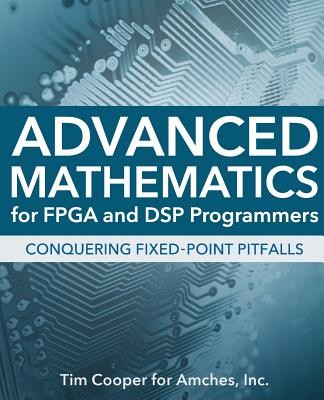
- We will send in 10–14 business days.
- Author: Tim Cooper
- Publisher: Leapin Leo Press
- Year: 2014
- Pages: 272
- ISBN-10: 0979058112
- ISBN-13: 9780979058110
- Format: 19.1 x 23.5 x 1.5 cm, softcover
- Language: English
- SAVE -10% with code: EXTRA
Reviews
Description
Advanced Mathematics for FPGA and DSP Programmers covers the mathematical concepts involved in FPGA and DSP programing that can make or break a project. Coverage includes Numbers and Representation, Signals and Noise, Complex Arithmetic, Statistics, Correlation and Convolution, Frequencies, The FFT, Filters, Decimating and Interpolating, Practical Applications, Dot Product Applications, and a glossary of DSP arithmetical terms. About the Author Tim Cooper has been developing real-time embedded and signal processing software for commercial and military applications for over 30 years. Mr. Cooper has authored numerous device drivers, board support packages, and signal processing applications for real-time-operating systems. Mr. Cooper has also authored high-performance signal processing libraries based on SIMD architectures. Other signal processing experience includes MATLAB algorithm development and verification, and working with FPGA engineers to implement and validate signal processing algorithms in VHDL. Much of Mr. Cooper's experience involves software development for systems having hard real-time requirements and deeply embedded processors, where software reliability, performance, and latency are significant cost drivers. Such systems typically require innovative embedded instrumentation that collects performance data without competing for processing resources. Mr. Cooper holds a Bachelor of Science in Computer Sciences and a Master's degree in Computer and Electronics Engineering from George Mason University.
EXTRA 10 % discount with code: EXTRA
The promotion ends in 20d.15:32:36
The discount code is valid when purchasing from 10 €. Discounts do not stack.
- Author: Tim Cooper
- Publisher: Leapin Leo Press
- Year: 2014
- Pages: 272
- ISBN-10: 0979058112
- ISBN-13: 9780979058110
- Format: 19.1 x 23.5 x 1.5 cm, softcover
- Language: English English
Advanced Mathematics for FPGA and DSP Programmers covers the mathematical concepts involved in FPGA and DSP programing that can make or break a project. Coverage includes Numbers and Representation, Signals and Noise, Complex Arithmetic, Statistics, Correlation and Convolution, Frequencies, The FFT, Filters, Decimating and Interpolating, Practical Applications, Dot Product Applications, and a glossary of DSP arithmetical terms. About the Author Tim Cooper has been developing real-time embedded and signal processing software for commercial and military applications for over 30 years. Mr. Cooper has authored numerous device drivers, board support packages, and signal processing applications for real-time-operating systems. Mr. Cooper has also authored high-performance signal processing libraries based on SIMD architectures. Other signal processing experience includes MATLAB algorithm development and verification, and working with FPGA engineers to implement and validate signal processing algorithms in VHDL. Much of Mr. Cooper's experience involves software development for systems having hard real-time requirements and deeply embedded processors, where software reliability, performance, and latency are significant cost drivers. Such systems typically require innovative embedded instrumentation that collects performance data without competing for processing resources. Mr. Cooper holds a Bachelor of Science in Computer Sciences and a Master's degree in Computer and Electronics Engineering from George Mason University.


Reviews